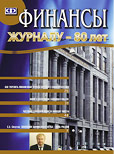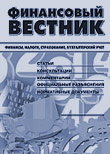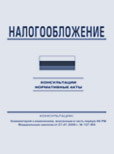Содержание
Актуально
E-mail: finance-journal@mail.ru
В интервью с заместителем министра финансов Российской Федерации
А.О. Котяковым подробно разбираются вопросы финансирования 5 национальных проектов, имеющих социальную направленность. Это – «Демография», «Здравоохранение», «Образование», «Культура», «Наука». Какие средства заложены в федеральном бюджете на 2019 год и плановый период 2020–2021 годов на реализацию госпрограмм, разработанных в данных нацпроектах? Какие цели должны быть достигнуты в результате реализации этих нацпроектов в 2021 и в 2024 гг.? Ответы на эти и другие вопросы – в интервью.
Финансы и бюджет: проблемы и решения
А.Б. Золотарева, руководитель научного направления «Правовые исследования» Института экономической политики им. Е. Т. Гайдара заведующая лабораторией экспертизы законодательства Института прикладных экономических исследований РАНХиГС, кандидат юридических наук
Е-mail: zolot@iep.ru
В статье предпринята попытка оценить сложившуюся в России модель бюджетного федерализма, с точки зрения ее соответствия экономической теории и практике других федеративных государств. Проведя краткий обзор исследований по проблемам бюджетного федерализма, автор констатирует, что экономическая теория не дает однозначных рекомендаций, как должно выглядеть оптимальное разграничение полномочий между уровнями публичной власти в федеративном государстве и в чем состоит разумный баланс между централизацией и автономией субъектов федерации. Изучение практики других федеративных государств демонстрирует существенную дифференциацию моделей федерализма по степени централизации. Россия принадлежит к числу централизованных федераций, что во многом предопределено крайне высокой дифференциацией уровня бюджетной обеспеченности российских регионов, что требует перераспределения через федеральный бюджет ресурсов ради горизонтального выравнивания. Вместе с тем, степень централизации в России существенно выше, чем в странах, придерживающихся той же модели федерализма.
Еще более серьезной проблемой является проблема нефинансируемых федеральных мандатов. Большинство регионов не в состоянии обеспечить надлежащее исполнение этих расходных обязательств, что имеет своим следствием подрыв бюджетной автономии региональных властей и лишение их стимулов к проведению ответственной политики. Решение проблемы нефинансируемых мандатов путем отмены норм федерального законодательства, предопределяющих объем расходов субнациональных бюджетов, необходимых для их исполнения, по мнению автора, невозможно, поскольку наиболее крупные и значимые мандаты сосредоточены в сфере социальной защиты и здравоохранения и прямо затрагивают права граждан. Поэтому смягчение остроты проблемы возможно только путем софинансирования из федерального бюджета соответствующих расходов субнациональных бюджетов.
Ключевые слова:бюджетный федерализм, теория бюджетного федерализма, модели федерации, российская модель федерализма, нефинансируемые федеральные мандаты.
А.С. Колесов, заведующий лабораторией Института экономики и права Петрозаводского государственного университета доктор экономических наук
Е-mail: askolesov@ psu.karelia.ru
В статье анализируется процесс формирования бюджетной, налоговой и таможенно-тарифной политики в Российской Федерации. В этой связи отмечаются новые положительные изменения в деле эволюции финансовой деятельности государства. Выделяются также наиболее важные, с нашей точки зрения, проблемы дальнейшего совершенствования разработки и реализации данной политики. В проекции выявленных «узких мест развития» предлагаются возможные пути их решения.
Ключевые слова:финансовая политика государства, бюджетная, налоговая, таможенная политика, совершенствование разработки финансовой политики.
С.П. Колчин, профессор кафедры бухгалтерского учета налогообложения РЭУ им. Г.В. Плеханова, доктор экономических наук
Е-mail: ksp61@mail.ru
А.В. Кеменов, профессор Департамента корпоративных финансов и корпоративного управления Финансового университета при Правительстве РФ, доктор экономических наук
В статье проанализирована экономическая ситуация, сложившаяся в России в связи с обострением международного положения, введением экономических санкций стран ЕС и США. Дана оценка финансово-кредитной политики и определены перспективы развития российской экономики.
Рассмотрены финансово-кредитные механизмы стимулирования экономического роста и обоснована целесообразность их применения при разработке финансово-кредитной политики.
Ключевые слова:экономический рост, финансово-кредитная политика, высокотехнологические и наукоемкие отрасли промышленности, санкции, налоговое стимулирование, ключевая ставка.
Казначейство: становление и развитие
А.В. Скосарева, старший казначей Отдела внутреннего контроля и аудита Управления Федерального казначейства по Волгоградской области
Тел.: +7(844)2333058
Е-mail: ufk29@roskazna.ru
Автор рассматривает роль и актуальность внутреннего финансового контроля и внутреннего финансового аудита для бюджетной системы России на примере УФК по Волгоградской области. Анализирует процессы, которые происходят в органах Федерального казначейства по совершенствованию законодательных и нормативных правовых актов РФ, регламентирующих осуществление контрольных и аудиторских процедур, а также документов, регламентирующих организацию и осуществление внутреннего контроля и внутреннего аудита. К одним из них относятся Стандарты внутреннего контроля и внутреннего аудита, применяемые контрольно-аудиторскими подразделениями ведомства.
Ключевые слова: внутренний контроль, внутренний аудит, контрольно-аудиторские подразделения.
Налоги: теория и практика
В.Г. Панcков, профессор Департамента налоговой политики и таможенно-тарифного регулирования Финансового университета при Правительстве РФ, профессор, доктор экономических наук
Е-mail: 5868116@mail.ru
Прослеживается история включения налога на наследство в налоговую систему пореформенной России и его отмены. Автор за восстановление налога, хотя и признает, что фискальный эффект от такого шага будет невысоким. Важнее его справедливость и социальная составляющая, особенно учитывая историю формирования личного богатства. У налога на наследство есть то несомненное преимущество, что он не касается доходов от трудовой деятельности и не снижает мотивацию к труду у наследников.
Предлагается прогрессивная шкала налогообложения в зависимости от размера состояния и степени родства, а также вида наследуемого имущества.
Ключевые слова: наследование имущества, фискальный эффект, расслоение общества, обогащение через наследование, прогрессивная шкала.
П.Ю. Малышев, доцент Школы финансов Факультета экономических наук Высшей школы экономики, кандидат экономических наук
E-mail: pmalyshev@hse.ru
Валютные активы в структуре сбережений населения России и растущий инвестиционный спрос населения на них. Иностранные акции и еврооблигации стали доступны для широкого круга физических лиц. В статье критически рассматривается действующий порядок исчисления и уплаты НДФЛ по операциям с иностранными акциями и еврооблигациями. Предлагается рассчитывать налоговую базу на основе пересчета финансового результата. Автор выступает за наделение брокеров статусом налогового агента в отношении дивидендных выплат по иностранным акциям, приобретенным на российских биржах. Автор убежден, что реализация указанных предложений будет способствовать развитию российского финансового рынка.
Ключевые слова: Санкт-Петербургская биржа, средневзвешенная ставка, покупка валюты, валютные депозиты, НДФЛ на дивиденды.
Страхование
О.А. Цамутали, доцент Департамента страхования и экономики социальной сферы Финансового университета при Правительстве Российской Федерации, кандидат экономических наук
E-mail: oatsmtl@gmail.com
Рассмотрены стартовые недостатки тарифной системы ОСАГО и результативность неоднократных попыток ее совершенствования. На основе статистических данных за 2015–2017 гг. доказывается достаточность средств, аккумулируемых страховщиками, для безубыточного осуществления ОСАГО. Автор также пишет о возможности перераспределения рисков повышенных убытков от автогражданки посредством перестрахования внутри страны взамен увеличения тарифов.
Ключевые слова: ОСАГО, средняя страховая премия, коэффициенты бонус-малус и возраст-стаж, средняя страховая выплата, финансовые результаты, коэффициент Коньшина, перестрахование и РНПК.
Т.А. Белоусова, доцент Департамента страхования и экономики социальной сферы Финансового университета при Правительстве Российской Федерации, кандидат экономических наук
E-mail: beloysova.ta@gmail.com
Статья раскрывает особенности применения процедур признания профессиональных страховых квалификаций в странах Евросоюза. Рассматриваются директивные принципы и система их признания на примере страховых посредников и страховых андеррайтеров. Анализируется приводимая статистика.
Ключевые слова: профессиональная квалификация, директивы ЕС, система признания, регулируемые профессии, компенсационные меры, профессиональный опыт.
Информация
finvestnik@mail.ru
В качестве центральной на налоговом форуме в Торгово-промышленной палате России фигурировала тема кодификации разрозненных неналоговых платежей, а также сокращения по возможности их перечня. Члены палаты в этом отношении выступают за базовый подход и подготовку комплексного документа, в то время как в Правительстве РФ планируют перевести в налоги шесть действующих платежей, а в Минфине обосновывают необходимость строго дифференцированного подхода. Вызвал критику слишком большой поток изменений, вносимых в налоговое законодательство.
Ключевые слова: налоговый кодекс, кодификация, налоговая нагрузка, неналоговые платежи, учет экологических затрат, обложение самозанятых.
Annotation
E-mail: finance-journal@mail.ru
The interview with the deputy minister of finances of the Russian Federation A. O. Kotyakov elaborates on the aspects of funding for 5 socially-oriented national projects: Demography, Healthcare, Education, Culture, Science. What are the federal budget funds for 2019 year and planning period of 2020-2021 for implementation of the governmental programs included in these national projects? What results should be achieved through realization of such projects during period 2021-2024? The answers given in the interview.
A.B. Zolotareva, Gaidar Institute for Economic policy; Institute for Applied Economic Research, Russian Presidential Academy of National Economy and Public Administration, candidate of juridical sciences
Е-mail: zolot@iep.ru
The article attempts to assess the existing model of fiscal federalism in Russia from the point of view of its compliance with the economic theory and practice of other federal states. Based on a brief review of studies on the problems of fiscal federalism, the author states that economic theory does not lay out clear recommendations on how the optimal division of powers between the levels of public power in the Federal state should look like and how a reasonable balance between centralization and autonomy of the subjects of the Federation should be achieved. The study of the practice of other federal states shows a significant differentiation of models of federalism as far as the degree of centralization is concerned. Russia belongs to category of centralized federations, marked by extremely high differentiation of the level of fiscal capacity of Russian regions, which requires redistribution of resources through the Federal budget for the sake of horizontal alignment. At the same time, the degree of centralization in Russia is significantly higher than in countries adhering to the same model of federalism. First of all, this is reflected in the almost complete lack of opportunities for the subnational Russian authorities to regulate their own revenue base. An even more serious problem is the one of so called unfunded Federal mandates – that is, expenditure obligations imposed on subnational budgets by Federal legislation without transferring the necessary financial resources for their execution. The vast majority of regions are unable to ensure the proper implementation of these commitments, especially in the sphere of protection and health care. Therefore, mitigation of the problem is possible only through co-financing by the Federal budget. However, as the author states, during the next 6 years this looks unlikely.
Keywords: budget federalism, theory of budget federalism, models of federation, Russian model of federalism, unfunded federal mandates.
A.S. Kolesov, doctor of economics, head of Laboratory at the Institute of economics and law of Petrozavodsk state university
E-mail:askolesov@ psu.karelia.ru
The article analyzes the process of formation of the budget, tax and customs tariff policy in Russian Federation. In this regard, he notices new positive changes in the evolution of the financial activities of the government and state. Most important problems of further improvement of this policy highlighted. Bottlenecks in this development identified and possible variants of their solutions proposed.
Keywords: state financial policy, budget, tax, customs policy, improvement of financial policy development.
S.P. Kolchin, professor at the Department of accounting and taxation of the Plekhanov university of economics, doctor of economic sciences
Е-mail: ksp61@mail.ru
A.V. Kemenov, professor at the Department of corporate finances of Financial university under the Government of the Russian Federation, doctor of economic sciences
The article analyzes the economic situation in Russia in the light of aggravation of the international politics, imposition of economic sanctions by the EU and US. An assessment of Russian financial and credit policy and prospects for the development of national economy, workings of financial and credit mechanisms for stimulating economic growth considered.
Keywords: economic growth, fiscal and monetary policy, financial and credit issues, high-technology and knowledge-based industries, sanction, tax incentives.
A.V. Skosareva, senior treasurer at the Department of internal control and audit of the Federal Treasury department in the Volgograd region
Mob.: +7(844)2333058
Е-mail: ufk29@roskazna.ru
The author examines the role and relevance of the internal financial control and audit for the Russian budget system as exemplified by one Russian region. The Federal Treasury aims at the perfection of Russian legal and regulative acts, control and audit procedures and documents pertaining to the organization and implementation of internal control and internal audit. They include the Standards for internal control and audit which are used by control-audit subdivisions of the treasury.
Keywords: internal audit, internal control, control and audit subdivisions.
V.G. Panskov, professor at the Department of tax and customs regulation of the Financial University under the Government of the Russian Federation, full professor, doctor of economic sciences
Е-mail: 5868116@mail.ru
This article traces back the history of including the inheritance tax in the tax system of post-reform Russia and its subsequent cancelation. The author is an advocate of reinstitution of the tax, even though he admits that its fiscal effect would be small. Of greater importance is justice and the social aspect, especially given the formation of individual wealth history. Inheritance tax doesn’t affect the incomes from the real economic activity and doesn’t lower the heritors’ motivation for labor. The progressive scale of the inheritance tax should be dependent on filiation and family ties (relation degree) and the type of inherited property.
Keywords: inheritance, fiscal effect, society stratification, heritable wealth accumulation, progressive scale.
P.Yu. Malyshev, assistant professor at the School of finance of the faculty of economic sciences of the Higher school of economics, candidate of economic sciences
E-mail: pmalyshev@hse.ru
The article deals with the problems associated with the current procedure of calculation and payment of personal income tax on transactions with foreign stocks and eurobonds. It justifies the proposal to switch to the calculation of the tax base related to the capital gain on foreign shares and eurobonds by converting the capital gain obtained in foreign currency into rubles at the average exchange rate for the period when the position was maintained. The author proposes to assign brokers with the tax agent status in respect of dividend payments received on foreign stocks provided these stocks were purchased at Russian exchanges. The implementation of these proposals will increase the attractiveness of foreign exchange-denominated securities for private investors and may contribute to the development of the Russian financial market.
Keywords: foreign exchange, stocks, dividends, eurobonds, private investor, taxation, personal income tax.
O.A. Tsamutali, assistant professor at the Department of insurance and economics of social sphere of the Financial university under the Government of the Russian Federation, candidate of economic sciences
E-mail: oatsmtl@gmail.com
The shortcomings of the MTPL tariff system were obvious for the author from the very beginning. She describes the consequences of repeated attempts to improve it. The statistical data for 2015–2017 proves the sufficiency of funds accumulated by insurers for break-even MTPL implementation and testifies to the possibility of redistribution of risks of increased losses through reinsurance inside the country instead of increasing tariffs of MTPL.
Keywords: average insurance premium, the coefficients, the bonus-malus and years of driving experience, the average insurance payout, the financial performance of insurers offering MTPL, reinsurance through RNRC.
T.A. Belousova, assistant professor at the Department of insurance and economics of social sphere of the Financial University under the Government of the Russian Federation, candidate of economic sciences
E-mail: beloysova.ta@gmail.com
The article reveals the specifics of applying procedures for the recognition of insurance-related professional qualifications in the countries of the European Union. The relevant principles and Directives adopted by EU considered as exemplified by cases of intermediaries and underwriters. The article analyzes statistics and the results of recognition (or non –recognition) of professional qualifications in each of the EU member-countries.
Keywords: professional qualifications, system of recognition, regulated professions, compensation measures, professional experience.
finvestnik@mail.ru
Codification of the separate non-tax payments (viewed as quasi taxes) and possible reduction of the list of such payments were central themes at the tax forum convened by the Russian chamber of commerce and industry. Arguments pro and contra described. Members of the chamber are in favor of the «basic approach» and preparation of one integrated document, encompassing all separate regulations, while the Russian Federal Government is planning to render into taxes 6 most important quasi-taxes (ecological and other). The Ministry of finances argues for necessity of strictly differential treatment of these payments. The participants of the congress expressed their anger on too frequent changes made to the Tax code.
Keywords: tax code, codification, tax burden, non-tax payments, environmental costs accounting, tax on self-employed, dialogue, tax collection and fiscal issues.













